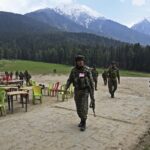Pakistan has asserted that it possesses “credible intelligence” indicating that India is preparing to launch a military strike within the next 24 to 36 hours. This claim follows the April 22 terrorist attack in Pahalgam, Indian-administered Kashmir, which resulted in the deaths of 26 tourists. India attributes the attack to militants backed by Pakistan’s military and intelligence services, a charge Islamabad denies.
Information Minister Attaullah Tarar stated that Pakistan’s intelligence agencies have gathered evidence suggesting that India is planning an imminent military operation. He warned that any act of aggression would be met with a decisive response. Defence Minister Khawaja Muhammad Asif emphasized that Pakistan would consider the use of its nuclear arsenal only if its survival were at stake.
The Pahalgam attack, which targeted a group of Hindu tourists, was claimed by a newly emerged militant group called the Kashmir Resistance. Indian authorities have linked the assailants to the Pakistan-based group Lashkar-e-Taiba. Investigations have identified two of the attackers as Pakistani nationals, including Hashim Musa, a former member of Pakistan’s Special Forces. Digital footprints and forensic evidence reportedly trace back to safe houses in Muzaffarabad and Karachi.
In response to the attack, India has suspended the Indus Waters Treaty, closed its main border crossing with Pakistan, and downgraded diplomatic ties. Pakistan has retaliated by suspending visas for Indian nationals, closing its airspace to Indian flights, and expelling Indian diplomats. The Simla Agreement has also been suspended by Islamabad.
Cross-border exchanges of small arms fire have intensified along the Line of Control, violating the ceasefire agreement between the two nations. India has granted its military chiefs the authority to determine the nation’s response, and the Cabinet Committee on Security is convening to discuss the situation.




 Militants Occupied Baisaran Meadow Days Before
Militants Occupied Baisaran Meadow Days Before 